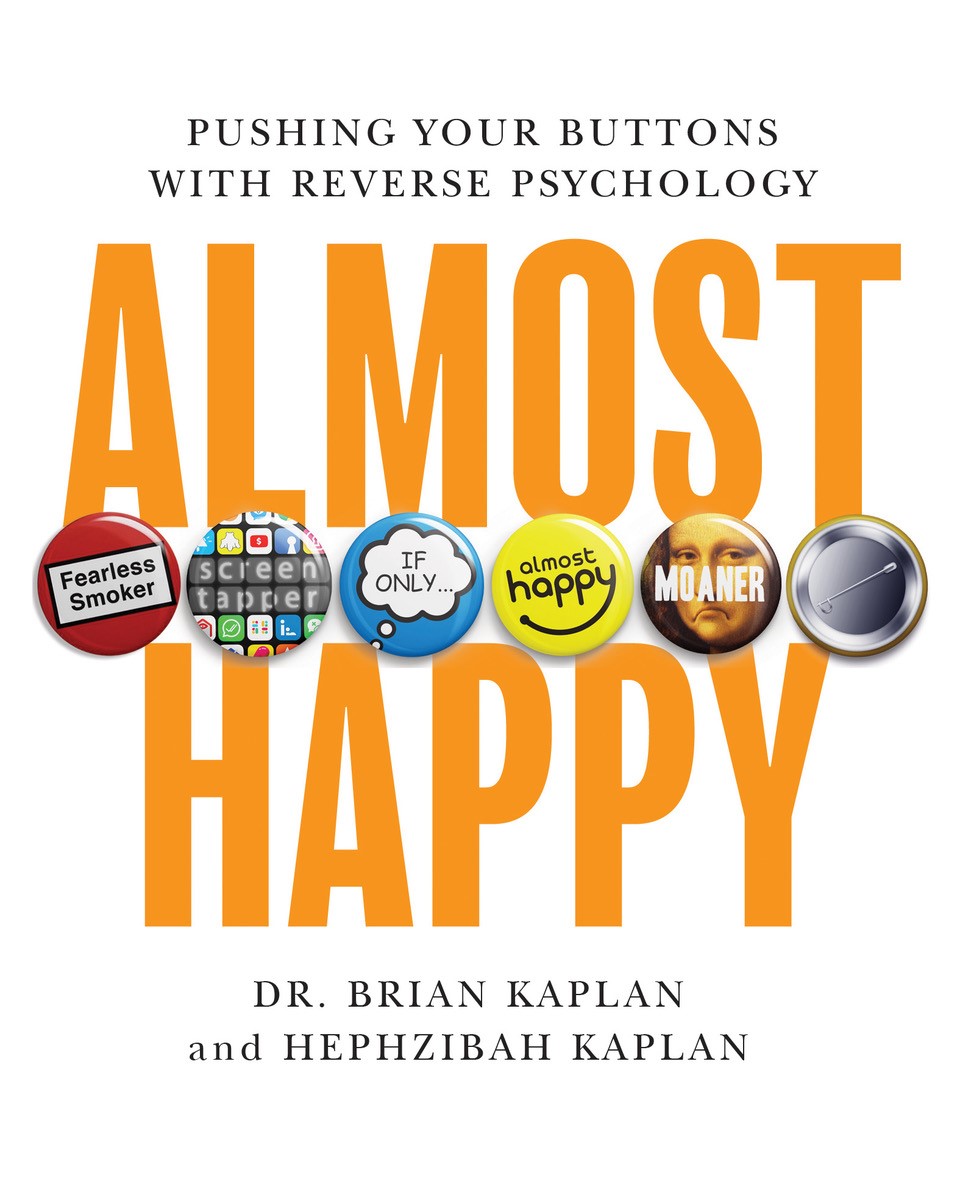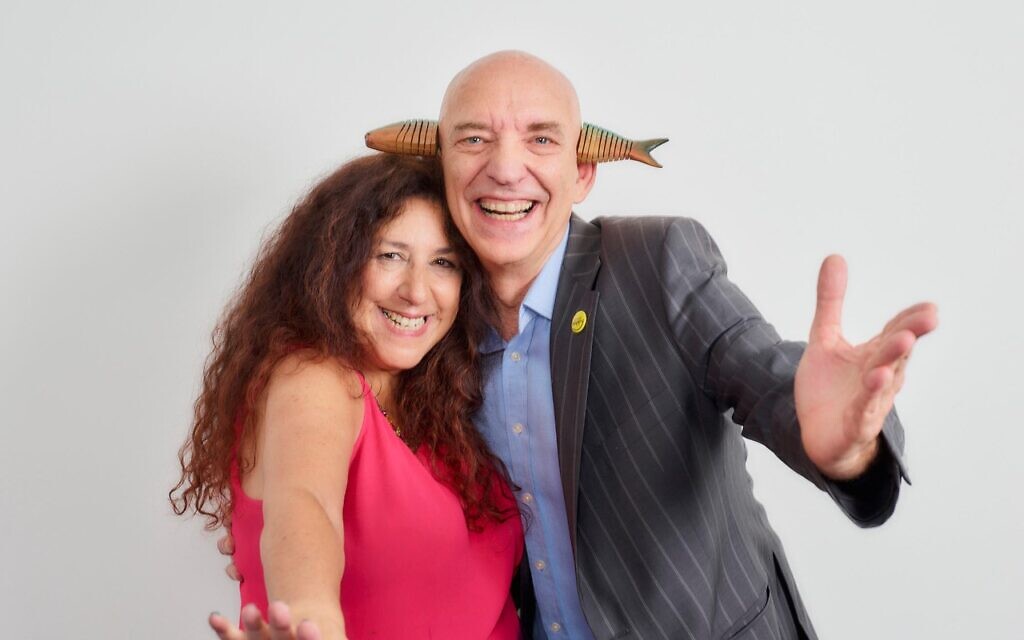Happiness is a Laughing Matter
Deborah Cicurel meets a doctor and a therapist who believe that laughter is the best medicine
If you imagine a therapy session, you might imagine being sprawled out on a couch, reliving your childhood while your therapist thoughtfully strokes his or her chin. And while that’s a popular image, and while traditional psychoanalysis certainly works for a great many people, one enterprising couple are turning the world of traditional therapy on its head.
Brian Kaplan, 65, a medical doctor, and Hephzibah Kaplan, 63, an art therapist, have been married for 30 years, and are the co-authors of Almost Happy: Pushing Your Buttons With Reverse Psychology. While laughing at yourself might seem like the very opposite of what you’d want to do when entering a therapy session, the Kaplans argue persuasively that reverse psychology, self-effacing humour and learning to laugh at yourself can be an energising impetus for positive change.
The couple, who live in West Hampstead, say that by building a rapport and gently teasing a patient (with their permission, of course), they can galvanise change and self-awareness in a more effective way, by helping patients to help themselves.
Get The Jewish News Daily Edition by email and never miss our top stories Free Sign Up
“As a therapist, I’m in favour of long-term therapy for some people, but other people could spend 30 years on the analyst’s couch blaming their parents,” Hephzibah explains.
“But if we tease them and say, ‘Why not blame your parents? And if not your parents, why not blame your astrological sign? Blame the government, blame society, and even blame God?’, they can start to see the ridiculousness of playing the blame game.
“In that, you catalyse a sense of agency and personal responsibility. This is what we are trying to do: stimulate a voice and a conscience that really know what they’re doing, to take charge and go forwards.
“When we encountered this notion that you could actually use comedy to change people for the better, we were blown away by people’s quick change and their responses to this approach.”
The book is a chunky, eye-catching read: there are no long chapters in small text, but instead 114 ‘buttons’ to include every type of reader and habit. These include people-pleasers, moaners, couch potatoes, coffee addicts and adulterers.
Each ‘button’ includes provocative suggestions for change, both jokey and serious. Brian estimates that the average person would identify with between five and 12 buttons – and “36 if you’re Donald Trump!”
The couple have purposefully made the book easy to read in 40 minutes, in an age where readers’ attention spans are always flitting between countless distractions and responsibilities.
“It was designed as an easy read that you can pick up and flick through,” Brian explains, while Hephzibah adds: “We are really trying to get people’s attention visually, as a form of art, because people respond to messages in the form of images. We want to make it very accessible.”
Brian adds that through reverse psychology, laughter can not only have positive mental effects, but can create physical changes too.
“In the words of Mark Twain, ‘Against the assault of laughter, nothing can stand’,” he explains. “Once you laugh at something within yourself, it cannot stand up and dominate you anymore. That’s the principle. You disempower things when you laugh at them. No one can withstand intensive laughter.
“If you laugh at the things that are holding you back, they will quieten down. Laughter is so good for you physically and psychologically. Everyone loves laughing: you feel better; your stress levels go down; your muscles relax; your immunity goes up; your lungs expand.
“When you’re in that laughing state, and you are talking to someone at the same time, you’re facing things within yourself that you need to deal with. We all laugh at the silliest things. In that high energy state, laughter acts as a balm to face something that might be a little bit painful that you might need to deal with.”
The Kaplans believe that adding humour into therapy is simply a reflection of real-life psychotherapeutic conversations and that this can be a positive force during their sessions.
“Psychotherapy may have started ‘officially’ when Freud wrote The Interpretation of Dreams but that doesn’t mean that conversations have not been psychotherapeutic before that,” Brian adds.
“There have always been psychotherapeutic conversations. If we go and look at all the psychotherapy rooms in the world now, you won’t see much laughter, but if you go and see all these psychotherapeutic conversations that are happening right now between a mother and a daughter, an aunt and a niece, a father and a grandfather, how likely is there that there will be joint laughter, warmth, a joke, a smile?
“What this book is saying is that we need to emulate the way people have helped each other with loving humour for thousands of years. The over-seriousness of therapy is unnatural to some degree.”
The couple’s approach, putting humour first, is something they feel is deeply ingrained in them as Jews.
“Genetic, social or cultural, I’m not sure, but Jews have a propensity to respond to trauma with humour,” Hephzibah explains. “How can we find redemption in suffering? Sometimes, it’s not by minimising the suffering, but by turning it on its head and thinking – where is the gain?
“If you call a dyspraxic person clumsy, it can feel critical, but if you call them a klutz, it can be endearing in a way, and that makes it more palatable for the person to laugh at his or her own ‘klutziness’.
“A bit of reverse psychology, some particular provocative strategies and interventions usually galvanise people to laugh at themselves, and by laughing at that inner saboteur, they can get over it and get on with life!”
Dr Brian Kaplan and Hephzibah Kaplan are the authors of Almost Happy: Pushing Your Buttons With Reverse Psychology, out now, priced £16

Thank you for helping to make Jewish News the leading source of news and opinion for the UK Jewish community. Today we're asking for your invaluable help to continue putting our community first in everything we do.
For as little as £5 a month you can help sustain the vital work we do in celebrating and standing up for Jewish life in Britain.
Jewish News holds our community together and keeps us connected. Like a synagogue, it’s where people turn to feel part of something bigger. It also proudly shows the rest of Britain the vibrancy and rich culture of modern Jewish life.
You can make a quick and easy one-off or monthly contribution of £5, £10, £20 or any other sum you’re comfortable with.
100% of your donation will help us continue celebrating our community, in all its dynamic diversity...
Engaging
Being a community platform means so much more than producing a newspaper and website. One of our proudest roles is media partnering with our invaluable charities to amplify the outstanding work they do to help us all.
Celebrating
There’s no shortage of oys in the world but Jewish News takes every opportunity to celebrate the joys too, through projects like Night of Heroes, 40 Under 40 and other compelling countdowns that make the community kvell with pride.
Pioneering
In the first collaboration between media outlets from different faiths, Jewish News worked with British Muslim TV and Church Times to produce a list of young activists leading the way on interfaith understanding.
Campaigning
Royal Mail issued a stamp honouring Holocaust hero Sir Nicholas Winton after a Jewish News campaign attracted more than 100,000 backers. Jewish Newsalso produces special editions of the paper highlighting pressing issues including mental health and Holocaust remembrance.
Easy access
In an age when news is readily accessible, Jewish News provides high-quality content free online and offline, removing any financial barriers to connecting people.
Voice of our community to wider society
The Jewish News team regularly appears on TV, radio and on the pages of the national press to comment on stories about the Jewish community. Easy access to the paper on the streets of London also means Jewish News provides an invaluable window into the community for the country at large.
We hope you agree all this is worth preserving.
-
By Laurent Vaughan - Senior Associate (Bishop & Sewell Solicitors)
-
By Laurent Vaughan - Senior Associate (Bishop & Sewell Solicitors)
-
By Laurent Vaughan - Senior Associate (Bishop & Sewell Solicitors)
-
By Laurent Vaughan - Senior Associate (Bishop & Sewell Solicitors)






















